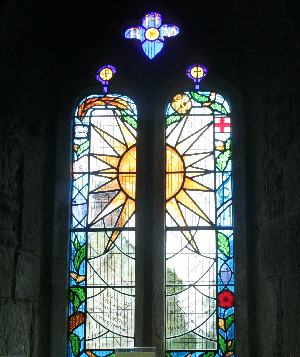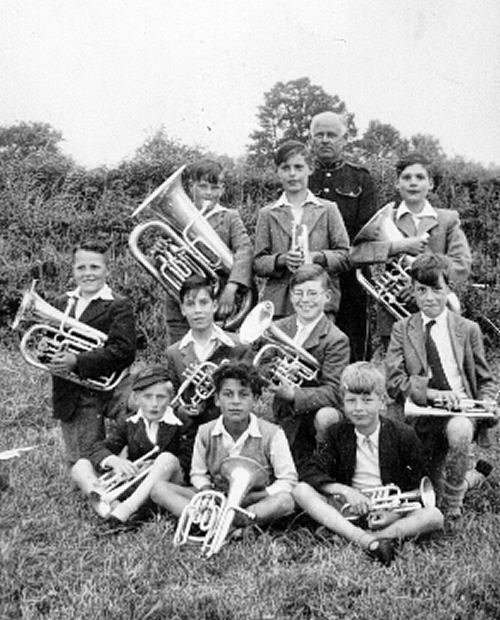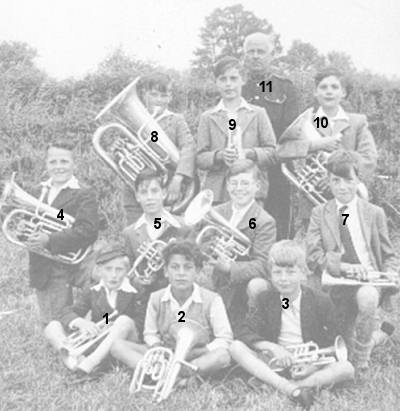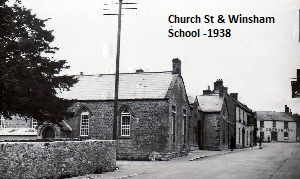My Father, Christopher Warren moved to Winsham circa 1936 where he moved to lodgings with the Courtenay family at the bottom of Church Street, Church Farm. A fellow lodger was Miss Harding – the school mistress. He resurrected the butcher’s business and on 23rd October married Doris Emily Webb at Kingstone church.
Together they worked very hard to make the butchers business viable, my Father told me that at the beginning of this period he cycled to Stoke Abbot and back on the trade bicycle and took 6 pence (2.5p) all day! Mum manned the shop during his absence and cooked meat pies and faggots for sale in the shop. During the war Dad was a special constable under the control of PC Burton – the Winsham PC. Another special PC who spent a lot of time on patrol with him was Mr Mildon – the village baker.
The butchers shop was at number 1 Church Street exactly opposite Eddie Partridge’s Victory Garage and I was born in a front bedroom on 11th June 1944. One of my earliest memories was of going to the infants class at Winsham School where my first teacher was Mrs Muggeridge later to be replaced by Miss Dalwood. That school room had a large sand box for indoor play with model shops and toy traffic signs, a large alphabet hung on the wall. It was in that school room that we all watched Queen Elizabeth’s Coronation on a TV loaned to the school for the event; a lot of us had never seen TV before! The playground had a large metal climbing ladder fixed to the wall and was the centre of all infant meetings and play activities, Mrs Dowell supervised and ensured no child was injured on the climbing frame.The middle class at school was taken by Mr Meaker, Mr Speakman and later
 Mr Palmer, my main memory of that
classroom was the gothic shaped door into the school hall and the
distinctive sound it made.
Mr Palmer, my main memory of that
classroom was the gothic shaped door into the school hall and the
distinctive sound it made. The top class with Miss Harding has many more memories. The huge map of the world, mostly pink in the those days, hung directly in front of us. I may well have got my desire for travel from the hours spent looking and wondering at that map. A large photograph of Field Marshall Harding hung on the western wall of the room; Miss Harding was very proud of that as she was of her school especially when she introduced the school cap, dark green with a prominent WS in gold on the front. Miss Harding was an inspiration to children, she could bark but very rarely needed to bite- I am sure that I am only one of very many young children that she set on a solid path through the University of Life. One of her favourite sayings when one of us tried to have one over was ‘I may be cabbage looking but I am not green’. I shall never forget her embarrassment when she displayed our paintings of flags prominently on the wall only for Nurse Ralston, an ardent Scot, to loudly proclaim that the Saltire was NOT a blue cross on a white background!
Left: A Memorial Window can be seen in St. Stephen's, placed by public subscription.
It carries the inscription 'In Memory of a much loved teacher-Beatrice May Harding'
 |
 Key: 1.David Griffin; 2.Godfrey House; 3. Alan Ackhurst 4. Robert Warren; 5.David Evans?; 6. Michael Evans; 7. Peter Evans; 8.Pat Loaring?; 9. Victor Chubb; 10. Mervyn Turner; 11. Bert Spurdle |
Some of the others in the class were Helen and Jill Partridge, Rosemary Hallett, Cybil Dare, Heather Forsey, Christine Nicholls, Tony Bone, Martin Lawrence, Harold Nicholls, Michael Evans, Victor and Douglas Chubb, Mervyn Turner, Kenny Down, Allan Akehurst, Geoff Peacock, Billy Parsons, Ann Peadon, Diane Evans, Peter Evans, Keith Miles, Valerie and Philip Lacey, Michael Lucking, Margaret Dore, Allan Trowell, Brian Willett, David Strawbridge, John Robbins, Christopher and Carol Beer.
I left Winsham School in 1956 and went to Crewkerne Grammar School however Winsham was always home; the gate at the end of the garden was freedom to the fields and hedgerows owned by farmers; Saunders, Dommitt and the Courteney sisters. The bridge at Axe water was a meeting place for fishing and the setting of night lines in the river Axe. One of the other pastimes was tag on the hummocks of the small tributary river near the railway bridge, someone always fell in and got a good soaking!
The football club was a main focus of village life and the football ground moved from Whatley to West Street in about 1960. I remember Winsham winning a cup in the early 50’s and driving up through the village with the Captain astride of Eddy Partridge’s bus bonnet proudly displaying the trophy . We had two teams and the first team was always well up in the Perry Street League. In the 50’s there was a competition to be the football mascot judged by how much you could collect. Tony Bone collected more than me and was the first team mascot and I was reserve team mascot and proudly wore my kit with the ‘famous’ red and blue quartered shirt to the first away game at Kingsbury Episcopi . This led to a fight led by several opposition boys from which I was rescued by our goal keeper Ralph Dore – not a good idea for the lone mascot to wear his kit to away games!
My turn to play for Winsham Reserves came in 1959 when we were two players short. Mervyn Turner and I were told to get our boots and play, it was against Drimpton during their first year in the Perry Street League.
Football was the main pastime for us, games in the top recreation ground were often joined in the evening by local grown up men who had played for the village team in the past. On Sunday afternoon in the 50’s six or eight of us would go off for a walk, always with a tennis ball and a game would ensue in the road often at the top of Bere Hill toward Maudlin Cross or near Box Hill towards Ammerham. This had been a Sunday afternoon tradition for years and in my time the participants included Dennis and Harold Nicholls, Peter Good, Ray Knott, John Holt and always Charlie Beer, who although being 30plus years older than us took part and was our mentor on many subjects. Charlie always led the Winsham boys into church for the Remembrance day service and we were always on our best behaviour for the service and parade.
The scout group was run by the Vicar, Rev T Childs and the meeting held in the Vicarage, summer camp was usually at Ladram Bay to where we were taken in the back of a lorry owned by Alf Robbins of Dunroamin , Fore Street. Scouts was fun however with hindsight a group of such lively boys were more than a handful for the Vicar.

Rev Childs also ran the choir which was well supported and I remember Norman Phelps singing in his high pitched voice; I think John Miles was the Head choir boy in the late 50’s.
I also belonged to the boys band , under Mr Spurdle who was a very patient and pleasant band master. Other members included John Contreras (Cornet), Mervyn Turner (euphonium) , Pat Loaring, Godfrey House, Victor Chubb and of course David Griffin who went on to be a very good player.
David's Father Mr Les Griffin started a youth group above the Methodist Church where I remember making papier mache plates.
Around 1960 a youth club was started as several parents were getting concerned about us. PC Rowe, Mr Alf Evans and I think George Higgins, Landlord of the Bell Inn got things going and several of us were included on the committee to run the club in the village hall, I remember Anne Peadon, Heather Down, Diane Evans, Mervyn Turner and Victor Chubb as regular attendees.
The Jubilee Hall was the only public meeting place and I remember the Monday night films in the early 50’s shown by Mr Simmons who arrived in a small dark blue van with a huge old projector and reels of film. The social evenings were good village fun and mainly organised by either the band or football club. In the late 50’s there were some good village dances and in those days Eileen Male’s accordion band was the top group of South Somerset with such numbers as ‘kiss me, honey, honey kiss me’ These dances were always well attended by young folk from Winsham and the surrounding villages.
A lot of the older village people were always ready to give their time to organise the village fetes, social evenings and the whist drives and to take the lead in such organisations as the boy’s band – Mr Bert Spurdle, the football club Mr Bucky Lacey, the Methodist chapel youth movement – Mr Les Griffin , the scouts and choir – Rev T Charles, the guides – Miss Harding and Miss Creech and Mr George Higgins, Landlord of The Bell who provided the first juke box in the village for our use.
The big night out was on Saturdays and usually to a Chard cinema to where 6 or 8 of us would ride our bikes for the evening. This period did not last long as we soon got motor bikes, pick-ups and vans – the range of our travels and experience increased tremendously!
It was not long after this at the age of 17 and three quarters I left the village however not before experiencing the workings of the Law on a Sunday evening in February 1962 when I stopped a fire in a barn at Whatley Farm. That was the penultimate fire set by the Chard fire raiser, I think he set 19 altogether. There was a reward totalling £200 for his arrest and I got £100 which my Mother collected for me as the Royal Navy refused to release me for the day.
A walk up Church Street in the early 50’s would start with Emma and Eva Courtney’s farm on the left, they made loose hay in ricks and I often helped. Next up was Mr and Mrs Partridge, Helen and Jill at Victory Garage and then the Vicarage with the Rev and Mrs Childs and his Mother-in-law Mrs Peddlestone. On the right side at the bottom was a large garden with Mr Jack Boait’s wooden garage for his taxi and the first house was Mr and Mrs Harold Spurdle and Sheila and then Rex and Roy Phelps and their parents. The next was Charlton house with Mr and Mrs Facey, Brian and Anne followed by Mr and Mrs Hollins and then Mr and Mrs Trowell ,Allan and Richard. On the other side of the passage was Mr and Mrs Hallett, Rosemary and Fay. Through the passage and to the cottage was Mr and Mrs Jim Evans, Michael and Myra who were replaced by Mr and Mrs Charlie Wood, Keith and Christopher, he was an ex bomber crew rear gunner.
Next door to Mr and Mrs Hallett in Church Street was Mr Frank and Ivy Peadon, Pat and Mary; later replaced by Mr and Mrs Les Staples. Next up was the butcher’s shop, my home, exactly opposite Victory Garage. Next door Mr & Mrs Chubb, Brenda and Ethel and then Mr & Mrs Charles Phelps. The carpenter’s workshop next door with the house was occupied by Mrs & Mrs Percy Loaring and later by Mr & Mrs Churchill and John Contreras who moved there from Court Street , then Mr & Mrs Bryant, Hector and Douglas and Caroline Spencer their housekeeper who had lived in a pair of cottages with Mr Frank Bridle at Axewater; I watched the cottages being blown up by Pat Wheaton in about 1950.
Next up was Mrs Dore and Ralph and then Mr & Mrs Ted Turner, Mervyn and Michael. Opposite the church was Mr & Mrs Down, Kenny and Gordon and the other side of the alley way Mrs Pine.
Next was Mr & Mrs Jack Boait and then Daisy Boait’s shop. The shop was very run down and contained very little except sweets in jars and every spring a good range of Dunne’s seeds. Miss Boait had a slightly wild appearance and a lot of children were a little frightened of her but she was quite harmless and I always spoke to her and got a pleasant reply. She owned a very overgrown and untidy orchard opposite Malthouse cottages and it was a wonderful playground for children.
Next up Mr & Mrs Meech and Tony and then a cottage occupied by Mr Lawrence, it has been demolished, however I shall always remember him sitting in his doorway enjoying the summer sun. I shall never forget his devastation when he told a group of us passing children about the huge defeat inflicted upon the England football team by Hungary in the early 1950’s.
Opposite was Pools Lane and at the bottom Mr & Mrs Dolly Singleton, Sheila and Terry (Bushy to the boys) .Next door was Mr & Mrs Florey. The Bell Inn was occupied by Mr & Mrs Bill Partridge and my great rival and mate Tony Bone lived there with his parents as well. The Bell changed hands several times but I shall always remember George Higgins and his wife, he was an ex regimental sergeant major and had a wonderful quality of character about him, he was below average height but well above average in leadership ability and he gave quiet guidance to a lot of lads and went on to become a Chelsea pensioner.
Opposite the school was Mrs Bath and then the Baker’s shop with Mr & Mrs Midon, Isobel and Bernard, who became a very good rugby player in Somerset. They were followed by Mr & Mrs Hood and Margaret and Mr & Mrs Akehurst, Jean and Allan.
Opposite of course was Miss Harding and then the Kings Arms also known as Tommy’s occupied by Mr & Mrs Ackland, Peggy, Poppy and Paul Hunt who joined the Royal Navy some 6 years before me. Next was Mr & Mrs Bert Paull and Douglas followed by Mr & Mrs Rawlins who had a radio and TV shop in Chard and then the post office and shop run by Mr & Mrs Appleby and later Mr & Mrs White, Miss Creech was always the post mistress and the smell of the parcels and hot wax and the sound of her stamping the letters very heavily are with me today. Mrs Manning was opposite next to the Jubilee hall and Miss Creech at the top of Church Street on the corner.
I must mention Art Manning’s garage, the first on the right going up Fore Street . It was an emporium of absolute junk! He brought the daily papers to the village, provided the distilled water for wireless accumulators and sold petrol from a very old pump where he hand pumped the fuel up to a large glass measuring cylinder until the required amount was shown and then discharged it by gravity into the car’s fuel tank. He was a character and used the oldest phone that I have ever seen in use; a voice horn on a long plastic stem and an earpiece on a long lead. Furthermore he always blew into it noisily before talking. There were 2 other garages for petrol in those days namely Neddy Churchill’s yard and Victory garage.
At the top of the village was the George Hotel, ‘up top’ to the locals, Mr & Mrs Grabham were the Landlords having taken over from Frank and Ivy Peadon before I was born. They were later replaced by Mr & Mrs Spencer- Barnes who had great ideas for the hotel and started very well by trying to stop the village lads meeting at the traditional place – the village cross and pump outside of the hotel. The situation was never resolved but proved a source of entertainment when things were quiet. Our local policeman, PC Rowe was often on hand to keep order but nobody ever got into trouble and in retrospect I feel that he was a good and fair example of a village Bobby.
There is a corner in my heart that will always be for Winsham. It was a good place to grow up and a sturdy launching pad for the rest of my life. People who come to live in the village will probably never fully realise the depth and strengths of the old Winsham families, their ways and their feelings however if they tread softly, listen quietly and speak gently they should enjoy the village and all that it has to offer.
With best wishes to you all,
Robert Warren